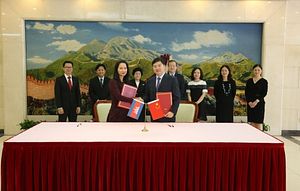Last week, Cambodia and China inked a pact to exchange financial information to combat money laundering and terrorism financing.
According to the National Bank of Cambodia, Cambodia’s Financial Intelligence Unit (FIU) and China’s Anti-Money Laundering Monitoring and Analysis Center (CAMLMAC) signed a memorandum of understanding last Tuesday morning to facilitate collaboration in this area.
The ceremony, held at the People’s Bank of China in Beijing, was presided over by the deputy governor of the People’s Bank of China and deputy governor of the National Bank of Cambodia.
“This MOU is based on the spirit of cooperation and mutual interest within the framework of national laws of each Authority to join [the] international community in the fight against money laundering (AML) and terrorism financing (CFT) in the region and the world,” the National Bank of Cambodia said in a press statement.
Cooperation within the MOU, the statement said, would focus on training, capacity building, and technical assistance.
Money laundering and terrorism financing has long been a major problem in both China and Cambodia. Cambodia last month was ranked the world’s sixth highest-risk nation (and Southeast Asia’s highest risk nation) for its susceptibility to money laundering and terrorism in the 2016 edition of the annual Basel Anti-Money Laundering Index. The U.S. State Department’s 2016 International Narcotics Control Strategy Report (INCSR) also said money laundering was a major concern in Cambodia, with the country getting a 10 out of 10 negative rating.
China has also been increasingly concerned about these problems and has intensified efforts to tackle them. Beijing was listed as a country of primary concern in the 2016 INCSR, with an Associated Press investigation in March unveiling that China is emerging as an international hub for money laundering. Hao Jinhua, the deputy director at the anti-money laundering bureau at the People’s Bank of China, warned in April that risks were further increasing.
“Risks of money laundering and terrorist financing are further increasing in line with cross-border uses of the yuan, the rise of internet financing, and the opening of capital accounts,” Huang told the annual meeting of the Association of Certified Anti-Money Laundering Specialists.
































